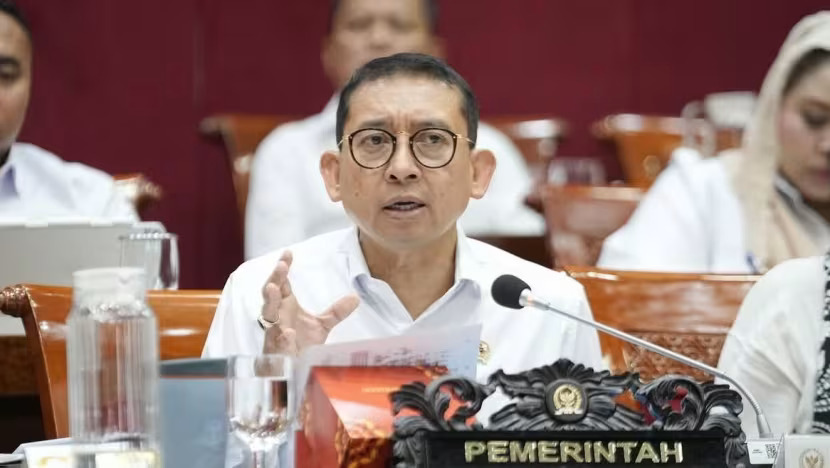(Singapore, 03.07.2025)Indonesia’s Culture Minister Fadli Zon firmly rejected requests to stop the ongoing rewriting of the official narrative of the country’s history, signaling that the project would continue untill its deadline next month (August) despite controversies such as its omission of the 1998 mass rapes claim.
Fadli stated that the revision project launched in 2023 during the presidency of Joko Widodo should not be halted due to political pressure, noting that Indonesia’s first president, Sukarno, had also advised that history should never be abandoned, Indonesia’s Chinese Harian newspaper reported yesterday.
Speaking at the Jakarta Theatre on Tuesday, Fadli said: “Why should we stop revising our history? This is a national project, meaning it is a government initiative. The narrative is being revised and rewritten by historians.”
The project was originally led by the Ministry of Education, Culture, Research, and Technology until the Ministry of Culture was split out from it in October last year after President Prabowo Subianto took over office from Joko Widodo.

Fadli continued: “History is essential. Bung Karno’s instruction was very clear: never abandon history,” using the familiar and respectful nickname “Comrade Karno” for Sukarno. Fadli was apparently referring to the phrase “never, ever abandon history, because history is the best teacher” from a 1967 speech of Sukarno.
Fadli, a historian from President Prabowo’s Gerindra party who was appointed in October last year, emphasized that the revision is a collective endeavour carried out by scholars and professionals in the field of history, not a political undertaking.
He noted that the project involves historians from 34 universities across Indonesia, which would focus on either of the three geographical regions of western, central, and eastern Indonesia so as to provide diverse narratives across the archipelago, which are then wrapped up with a national perspective.
Fadhli also denied claims that historians had withdrawn from the project, adding: “No historian has left. As far as I know, not a single one. They come from 34 universities nationwide.”
Fadli revealed that about 80% of the work has been completed, although he has not yet received the final manuscript. He also has not confirmed a date for public consultation or parliamentary discussion of the revision.
Legislators from the main opposition Indonesian Democratic Party of Struggle (PDIP) of former president Joko Widodo have been calling on the government to halt the project.
Esti Wijayati, a representative of the national assembly from the PDIP and deputy chair of the committee whose watch encompasses culture, stated that the government’s emerging version of history had sparked widespread arguments in society and even faced strong opposition from historians and civil society groups.
On Monday, Esti said: “We strongly request the suspension of this work because it has caused controversy and hurt many people. I believe there is no need for the government to insist on continuing it under the Ministry of Culture, as much of its content not only might provoke unrest but may also be historically inaccurate. “
Esti also highlighted provocative public statements made by the government regarding some historical issues, including Fadli’s claim that there were no mass rapes in 1998 during the downfall of President Suharto who had ruled Indonesia since 1965. That statement triggered widespread protests.
She believes this uproar further strengthens the call to pause and re-evaluate the history rewriting project.
A coalition comprising women’s rights bodies, human rights NGOs, pro-democracy groups, Chinese-Indonesian activists, and individuals is leading protests against Fadli’s claim that the 1998 mass rapes are rumours and had never happened. They strongly protest that these are well-documented human rights crimes that demand recognition, justice, and commitment to national memory.
Critics also argue that the historical revision also serves political interests, particularly of the current government. There are concerns that it whitewashes or downplays past abuses by powerful figures such as Suharto or institutions, such as the military and Suharto-era elites.
One of the most disputed episodes is the mass killing of suspected communists after their failed coup in 1965. Estimates of the dead range from 500,000 to over a million. For decades, the official narrative blamed the PKI (Indonesian Communist Party) entirely and justified the military crackdown led by Suharto. It was in the aftermath of the massacre that Suharto displaced Sukarno who was said to have aligned with the PKI.
Some pointed out that the term “revision” is misleading since the so-called “rewriting” largely and actually reinforce the entrenched narrative that goes probably as far back as 1965. For example, the legacy of Sukarno has lately been re-evaluated by historians more positively and that is not a welcome shift to the government. Meanwhile, Suharto would still be portrayed as the stabilizer and modernizer who brought “development” and “order” after the 1965 turmoil.
However, in the government’s view, even though the new version reaffirms past narratives, it is still a “revision” because it involves rewriting or restructuring of historical content. It at least involves reorganizing Indonesian history into three parts, namely Western, Central, and Eastern Indonesia, emphasizing both regional diversity and nation-building.
Indonesia’s new national history covering prehistoric times up to the Prabowo era is set to be launched on August 17, 2025, coinciding with Indonesia’s 80th Independence Day.
The updated narrative would serve as the official foundation for history education across schools in Indonesia.





































